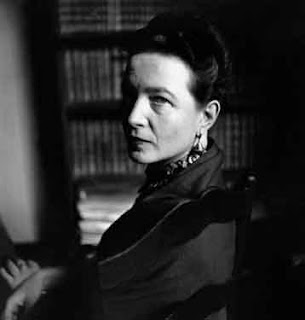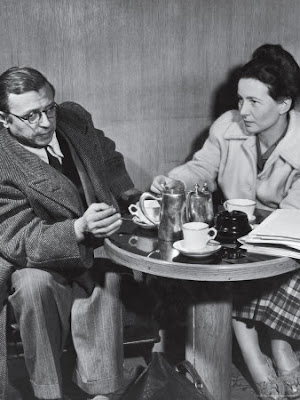Dialogue with Alexandre Gilbert on Simone de Beauvoir*
*This Dialogue was originally posted, thanks to Alexandre Gilbert, on The Times of Israelblog, 30 September 2017, featuring all four parts. For reading's sake, these questions are reblogged here, now beginning with the very first on David Allison's 'New Nietzsche' and turning, now, to Simone de Beauvoir.
AG ::
AG ::
2.Would
you say Simone de Beauvoir’s feminism was a Nietzscheism ?
BB ::
Certainly! But at the
same time, de Beauvoir was very wide ranging and she, like Sartre and like Merleau-Ponty,
was influenced by Husserl and especially Heidegger. Yet Nietzsche’s gift for
seeing through overlayers of culture suffuses de Beauvoir — as a scholar with a
breadth of reading and focus to match Nietzsche’s own, de Beauvoir draws on
antiquity, anthropology, history, literature, political economy in addition to psychology
and sociology. And she almost echoes
Nietzsche’s trenchant observation: “It is men who need to be educated better.” In that spirit, de Beauvoir although her
focus was on women never did lose sight of a kind of non- (or better said: not only) Hegelian but
Nietzschean dialectic attunement, looking not only at women but at the dynamic
with the ‘other.’ This was Nietzsche’s
variation on the master-slave dialectic and it foregrounded what de Beauvoir
called women’s complicity and the very grave dangers to woman’s being in the
world, existentially expressed to be sure, as de Beauvoir, before Hannah Arendt
already paid attention to the dynamic of lived life in all the dimensionalities
of a human lifetime, from birth to death.
The American de Beauvoir scholar,
Debra Bergoffen captures one aspect of the Nietzschean focus on educating men
better, as she remarked on The Hallelujah
Effect where I speak of the great Leonard Cohen regarding his often-observed
womanizing, to point out that women were not what his focus was about: it was
for Cohen as she noted the point I tried to make in my book about a certain tendency to male self-absorption, not ultimately
misogynistic because Cohen’s focus was always Cohen.




Comments
Post a Comment